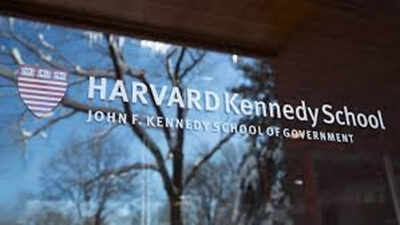
Harvard layoffs: Harvard Kennedy School (HKS) has announced staff layoffs and significant budget cuts as it grapples with financial pressures stemming from federal funding reductions and a looming tax increase on Harvard's $53.2 billion endowment.
The school's dean, Jeremy M. Weinstein, conveyed the difficult news in an email to faculty and staff, describing the challenges as "unprecedented" and underscoring the severity of the situation faced by the institution.The financial strain is largely attributed to policies enacted by the Trump administration, including multibillion-dollar cuts to federal research funding and restrictions on international students, both critical revenue sources for HKS.
Despite efforts to reduce costs through hiring freezes and paused merit raises, Weinstein indicated that layoffs were unavoidable, highlighting the harsh realities confronting one of the nation's premier public policy schools, as reported by the Harvard Crimson.Budget cuts and layoffs amid federal challengesIn his announcement, Weinstein detailed a series of austerity measures aimed at stabilizing the school's finances.
These include ending the lease on a key office space at 124 Mt. Auburn Street, halting all non-urgent construction and renovation projects, and reducing departmental budgets across the board. However, even these steps could not fully offset the financial challenges, forcing the school to lay off an unspecified number of employees."We began planning for budget cuts as early as February, but the Trump administration's actions have since brought on unprecedented new headwinds," Weinstein wrote, as reported by the Harvard Crimson.
The administration's visa policies, particularly attempts to revoke Harvard's certification under the Student and Exchange Visitor Program (SEVP), have further endangered the enrollment of international students, who made up 59 percent of HKS's student body last year.International student restrictions compound the crisisThe Trump administration's visa restrictions and travel bans have created uncertainty for international students, who play a vital role in the school's community and finances.
The administration's efforts to restrict student visas have been temporarily blocked by federal courts, but new attempts to revoke Harvard's SEVP certification persist. Additionally, President Trump's 12-country travel ban affects at least five current HKS students, creating further hurdles.Weinstein outlined contingency plans, including shifting to online coursework and offering a visiting program in Canada, should international student enrollments decline drastically.
These measures underscore the school's preparation for ongoing uncertainty, as reported by the Harvard Crimson.Looming tax increase threatens endowment and funding stabilityAdding to the financial pressure is a congressional proposal to hike the tax on Harvard's massive endowment. The House of Representatives passed legislation proposing a 21 percent tax on the endowment, which was later revised by the Senate Finance Committee to an 8 percent rate—still a sixfold increase from the current 1.4 percent tax.
This tax hike could cost Harvard approximately $200 million annually.University President Alan M. Garber has described this endowment tax threat as "the threat that keeps me up at night," according to the Harvard Crimson. Such a tax would significantly impact Harvard's financial resources and exacerbate budget difficulties across its schools, including HKS.Despite the bleak outlook, Weinstein pledged transparency and support during this challenging period. "I hope we can support each other and our departing colleagues during this difficult time," he wrote, as reported by the Harvard Crimson.
The layoffs and budget cuts at Harvard Kennedy School reflect broader financial challenges facing US higher education institutions amid shifting federal policies and economic uncertainty.

 6 hours ago
51
6 hours ago
51




























 English (US)
English (US)